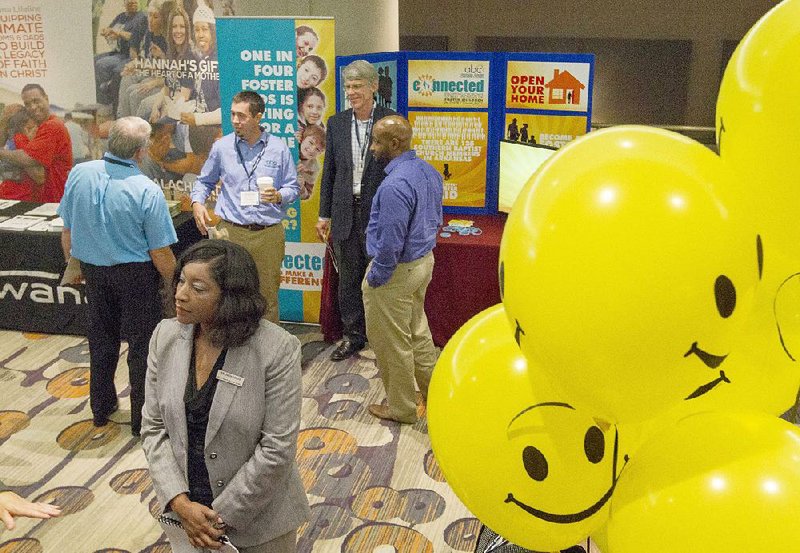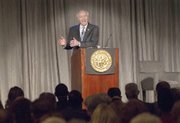Gov. Asa Hutchinson said Tuesday that he will ask lawmakers for $1 million in rainy-day money to hire 40 more staff members for the child-welfare division of the Department of Human Services.
The first-year Republican governor made the announcement at the start of the two-day Restore Hope Summit, which his office formed to encourage faith-based organizations to help the state provide better services for foster children and inmates who are re-entering society.
He expects legislators on the Arkansas Legislative Council to support his request to aid the children. The Legislative Council makes such decisions when the Legislature is not in session.
"I suspect that they will approve that. It is the right thing to do," Hutchinson said. "That is the beginning of the challenge because there are going to be more funding needs."
Department of Human Services spokesman Amy Webb said the additional money will be used to hire 29 caseworkers, seven program assistants and four supervisors.
Caseworkers help investigate reports of child maltreatment, assist with child placements, and work with families and court officials to put together corrective-action plans for parents. Program assistants aid caseworkers by handling some supervised visits involving children and prospective parents, and by providing transportation and other logistical support.
Hutchinson's announcement comes a little more than a month after he agreed with the findings of a consultant's report that the state needed to hire 200 more caseworkers, at a cost of roughly $8 million, to improve working conditions at the state agency.
Webb said currently each caseworker handles an average of 27 cases and that the additional staffing will get that closer to a target average of 20 cases per worker. The national recommended average for social service caseworkers is 15 cases.
"This will offer some relief," Webb said. "It'll take six to eight months, at the most, to get them where they have full caseloads. ... It's good to have them onboard."
Hutchinson praised faith-based groups and others for their work promoting foster care and providing transitional services for state criminals, but he said more needs to be done.
"Historically, we've given [parolees] $100 and a bus ticket, and that is a minimal chance for success in this environment today," Hutchinson said.
But increasing funding, by itself, won't fix the system. "Money doesn't solve all the problems," he said.
On Tuesday, the Restore Hope conference focused on the need for engaging volunteers, communities and organizations in helping the state's parolees move back into society through mentoring, job-training and employment services.
State prison officials said Thursday that there were 19,055 prisoners committed to the custody of the Arkansas Department of Correction, a new record.
The number of prisoners has been growing for the past two years since parole policies were tightened to rein in parolees who were not following the terms of their releases.
Since then, thousands who violated the terms of their paroles have been returned to prison. With prisons increasingly crowded, more than 2,000 state prisoners are now being held in county jails.
Prison and parole officials urged attendees at Tuesday's conference to get involved, saying that of the 6,198 parolees released in 2010, nearly 43 percent returned to prison within three years.
Kevin Murphy, chief deputy director for the Arkansas Department of Community Correction, told the crowd that the problem is not just moral, but financial.
"For every one of those individuals in prison, that's $23,000 a year. Multiply that by about 19,000, that's a lot of [tax] dollars," Murphy said. "We are not the answer. We need your involvement."
Murphy said an effort to help relieve prison crowding and lower recidivism is about to start.
Earlier this year, lawmakers authorized about $5.4 million to help pay for a Community Correction Department program designed to reduce recidivism and prison rolls by putting soon-to-be-released prisoners in centers that will offer a range of services, such as job training and mental health treatment.
The state will contract with eligible nonprofits, faith-based organizations and other groups to run those types of centers across the state for medium- to high-risk offenders.
Murphy said Tuesday that the first of the two centers, which are in Little Rock and Conway, will start offering services as soon as next week.
Metro on 08/26/2015

